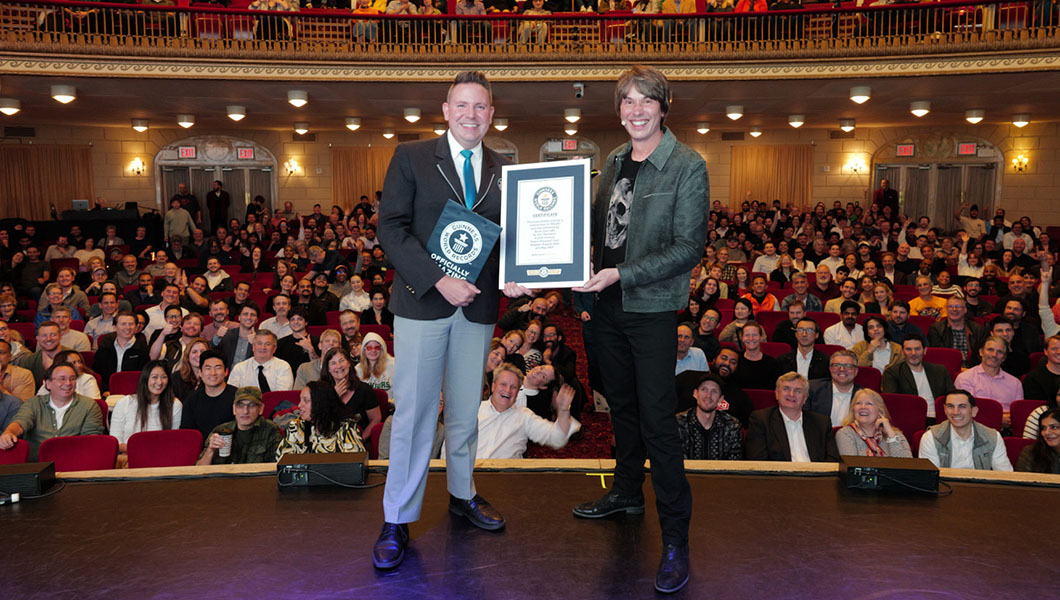Professor Brian Cox smashes his own record with best-selling science tour

For the fourth time, Professor Brian Cox has officially broken the record for the most tickets sold for a science tour EVER.
The English particle physicist, broadcaster and author has once again achieved the record-breaking milestone with his worldwide Horizons: A 21st Century Space Odyssey tour, amassing a whopping 369,297 tickets between August 2022 and May 2025.
He was presented with an official certificate by Guinness World Records Adjudicator Michael Empric, who joined him on stage at New York City’s Town Hall during the North American leg of the worldwide tour.
 Professor Brian Cox celebrates his new record in May 2025
Professor Brian Cox celebrates his new record in May 2025
“Breaking his own record for the fourth time is a testament to Professor Brian Cox’s extraordinary ability to inspire," said Guinness World Records' Editor-in-Chief Craig Glenday.
"His work has not only made science more accessible and exciting but has sparked curiosity in audiences around the world."
Similarly, Horizon achieved the title for most tickets sold for a science tour in 2022, earning a coveted spotlight inside the pages of Guinness World Records 2023.
On that occasion, we met Brian at London's world-famous Royal Opera House to learn more about his record-breaking Horizons – A 21st Century Space Odyssey tour.
We chatted about some of the most impressive records in the universe: from the tiny particles to the giant galaxies, the interview took us on a journey through some fascinating, out-of-this-world space facts.
Together, we tried to answer one question: what are the biggest, smallest and most impressive elements in the universe?
It is wonderful that so many people want to spend an evening contemplating our place in the Universe. I’m very proud on behalf of the entire team involved in putting on my tours that we can extend this record. - Professor Brian Cox
With plenty of space records in our database, the remit of Guinness World Records is not strictly confined to our planet.
However, we can think of many potential records broken much further afield in the Universe: awe-inspiring spacetime records that are still to be discovered or cannot be monitored, like the biggest black hole, the fastest object in the universe or the longest wormhole ever.
What if, instead of world record titles, we could monitor records across the universe with infinite knowledge of the galaxy?
What would be the biggest black hole in the universe?
Fittingly, many giants would compete for the "most massive black hole" record title.
However, the record for the nearest supermassive black hole is officially recognized by Guinness World Records: it was set by Sagittarius A* (Sgr A*), a supermassive black hole situated at the Galactic Centre of our very own galaxy, the Milky Way.
Discovered in 1974, this bright object is located at around 27,000 light years away.

What would be the record title for the fastest thing in the universe?
"It would be a photon of light entering your eye," the professor explains.
"The speed of light is the universal speed limit. That's the speed of massless objects."
The fastest matter in the universe title dates back to 2005, and it still belongs to blobs of superheated plasma ejected from black holes in the cores of extremely active galaxies known as blazars.
These blobs have been observed moving at 99.99% of the speed of light.
From the oldest and most distant galaxy (33.4 billion light-years away from Earth) to the record for the most accurate measure of the age of the universe (estimated at 13.7 billion years old, with an error of just 1%), we can indeed count the records in the universe.
Although there's still so much more to explore and discover, we can answer at least some questions about the universe thanks to cutting-edge technology: one of the game-changing innovations was the James Clerk Maxwell Telescope, the largest submillimetre telescope in the world.
Located in the Mauna Kea Observatory in Hawaii, USA, instead of an optical mirror it uses a massive 15-m (49-ft) dish to collect submillimetre radation.
I hope the audience will go away thinking about those big questions as they look at the stars and the sky.
Record-breaking science tours
Notably, Brian's visually stunning and thought-provoking tours have achieved the title for most tickets sold for a science tour four times: the first record was set in 2016, and the same success was replicated with the 2017 tour across the UK the following year.
The third record title was officially announced in 2022.
From the record-breaking 75,193 tickets sold in 2016 to the 158,589 achieved in 2017, leading up to the massive success of the best-selling 2019 tour (counting 230,873 tickets at the time of the announcement), it's clear that this odyssey across space and time keeps attracting an ever-growing audience.

"It's a pleasure to celebrate the ongoing success of Brian’s mind-expanding tour," Craig commented regarding the record broken in 2022.
He carried on: "As the world around us seems to get increasingly complex and confusing, it's reassuring to know that Brian’s on hand to put us in our place."
We really do live in a wonderful, complex and beautiful universe, and I can think of no better a person to guide us through it. - Craig Glenday
"We are living through difficult times, and I think that means that many people are looking for a little escapism, but also a wider perspective," added Brian during the 2022 interview.
Looking at the future, it seems clear that the particle physicist aims to keep using his record-setting tours to explore the most faraway corners of our big, fascinating, amazing universe.


